Sebastian Coe, the organizer-in-chief who more than anyone made the London Games possible, is absolutely right. The Olympics really are the Greatest Show on Earth.
So cheers, mate, to you, London, for reminding us of that fact.
Unlike four years ago in Beijing, we could wrap ourselves in the sport and the human drama without having to ignore our conscience. In this splendid world city that proved so telegenic, with marathoners sweating past the Tower of London and cyclists zooming by Buckingham Palace, the hairs on the back of our necks tingled for all the right reasons.
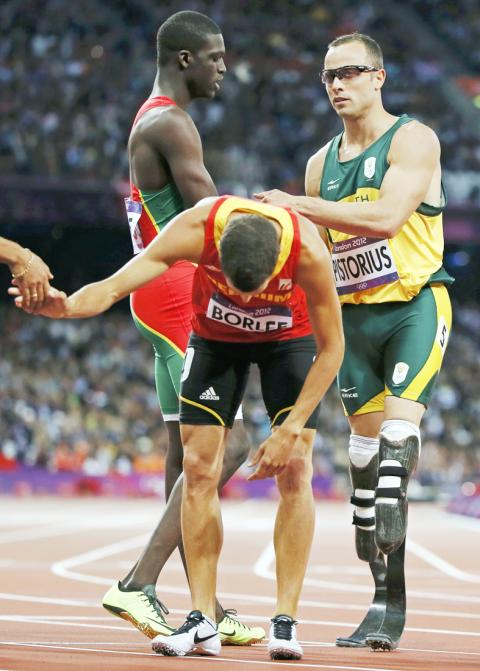
Photo: Reuters
In short, after the 2008 Summer Games that were as much about dissidents and control as about sport, we, the world’s people, got our Olympics back, and they are just that — Games for the entire planet.
Points in London were scored in baskets, goals and on shooting targets, not in geopolitics. British Prime Minister David Cameron did display an uncanny knack for turning up at venues where hometown athletes were scooping up gold, but here we could mock his opportunism because these were Games with good humor aplenty.
Filmmaker Danny Boyle set the tone, parachuting in stunt doubles of Queen Elizabeth II and James Bond to his quirky opening ceremony that sent the message that this Olympic host country was proud to show itself off to the world, as they all are, but could laugh at itself, too.
Above all, these were two weeks devoted to sport and not the baggage that often goes with it, and because sport is one of humanity’s greatest inventions, it was two weeks devoted to us, a group hug for the human race.
The athletes were the actors, of course, but we were their audience and we lived the Olympics through them, vicariously.
They were us at our most glorious, striving to go faster, higher, stronger and be the best we can be. Us shaking hands and congratulating each other after sweating bullets to beat each other.
Surely, the world would be a better place if humans all got along like we do at the Olympics. Why do we seem able to do that only in two-week bursts?
The Olympics are in the business of manufacturing special moments and there were too many to list.
Men’s 400m champion Kirani James asking double-amputee Oscar Pistorius for his name bib to keep as a souvenir reminded us that sportsmanship and winning isn’t everything don’t have to be mere slogans.
The Olympic Stadium crowd of 80,000 singing along to All You Need Is Love on the night Jessica Ennis led the heptathletes she beat on a shared lap of honor made the Beatles’ idealistic lyrics seem possible, even true.
As much as Britons would love to be able to bottle the glow of the Games, to bring out on one of their many rainy days that mercifully largely stayed away for the two weeks, we’re not naive enough to think that it will last.
As the Spice Girls and The Who cleared their throats for Sunday night’s closing ceremony, soccer players from Manchester City and Chelsea spent the afternoon hacking at each other in the Community Shield game that starts the English season, collecting eight yellow and one red card.
This was sport returning to business as usual, ruled by money and a stage for oversized egos, not sport the noble endeavor and higher calling it can seem at the Olympics.
“Seem” being the operative word because there was ugliness at the London Games, too — although in mercifully small doses.
Hypocrisy reared its head in badminton, where administrators suddenly got all righteous and made an example of eight players who didn’t try hard enough to win. British media vented about empty seats at venues before British athletes gave them gold medals to write home about. The French sniped at the success of their favorite enemies, the British.
Only 18, Colombian athlete Diego Palomeque Echavarria was going home not with a medal, but with the label “cheat” after lab technicians found testosterone in his urine. Dozens of other frauds never made it to London, caught by drug tests that taxpayers largely fund. In this case, our money was well spent.
So, too, was the £9.3 billion (US$14.5 billion) Britons forked out for this party. That was far more than they were initially told the Games would cost.
Olympic gigantism is still a problem (other than to add to Michael Phelps’ record medal haul, do the Games really need 34 swimming events?)
However, the use of temporary venues showed future Olympic hosts alternatives to building white elephants. The basketball and water polo arenas are among those that will be dismantled and the Olympic Park will become a green lung for the long deprived east of London, with ducks paddling on cleaned-up waterways and trees to picnic under.
Let’s not get too serious, though. Not after these Olympics where Usain Bolt had us in stitches with his exuberant antics and declaration: “I am now a living legend. Bask in my glory” — surely the gold-medal quote of the Games.
Not after the “Incredible Hulk” — German discus thrower Robert Harting — gave us a hilarious victory celebration, ripping open his shirt and jumping the hurdles, and not after the cheery honesty of British rider Scott Brash.
Asked about his gold medal in equestrian team jumping, Brash replied: “I really hope it improves my pulling power with women.”
It was all good and, we hope, clean fun.
The Olympics as they should be.
Us, at our best.
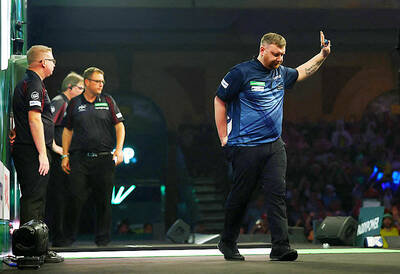
By the time Cameron Menzies finally left the arena on Monday, the blood gushing from the gash on his right hand had trickled down his wrist, part of his forearm and — somehow — up to his face. Smeared in crimson and regret, and already mouthing sheepish apologies to the crowd, he disappeared down the steps, pursued by a stern-looking Matt Porter, the chief executive of Professional Darts Corp (PDC). The physical scars from Menzies’ encounter with the Alexandra Palace drinks table after his 3-2 defeat against Charlie Manby at the Darts World Championship would be gone within a few weeks.
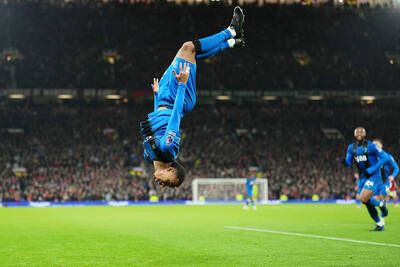
Manchester United on Monday blew the lead three times to miss out on moving up to fifth in the Premier League as AFC Bournemouth would not be beaten in a thrilling 4-4 draw at Old Trafford. United have lost just once in their past 10 games, but Ruben Amorim would be frustrated as more points at home were frittered away despite arguably the best attacking display of his reign in charge. Amad Diallo and Casemiro gave the hosts a halftime lead either side of Antoine Semenyo’s equalizer. Two Bournemouth goals from Evanilson and Marcus Tavernier in seven minutes at the start of the
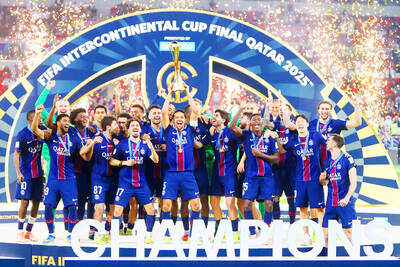
LOW-GOAL SHOOT-OUT: Of the nine penalties in the shoot-out, only three went in, with Flamengo’s Samuel Lino, and Vitinha and Nuno Mendes of PSG netting Matvei Safonov on Wednesday made four straight penalty saves in a penalty shoot-out to help Paris Saint-Germain beat Flamengo in the Intercontinental Cup final and win a sixth trophy of the year. The Russian goalkeeper was thrown in the air by his teammates after his exploits in the shoot-out, which was won 2-1 by PSG after a 1-1 draw after extra-time. It completed a trophy-laden 12 months for the French team, who had already won the Trophee des Champions, Ligue 1, the Coupe de France, the UEFA Champions League and the UEFA Super Cup — also on penalties against Tottenham Hotspur in
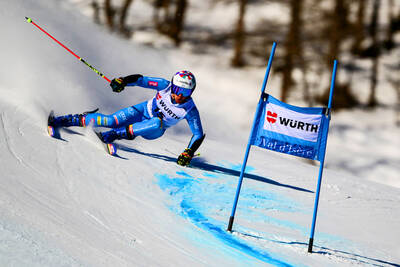
Italian Luca de Aliprandini described Saturday’s World Cup giant slalom at Val d’Isere as the hardest race of his life, coming two days after his Swiss partner Michelle Gisin suffered a heavy fall in training which required neck surgery. De Aliprandini finished 26th in the men’s event won by Loic Meillard, but the result paled into insignificance with two-time Olympic ski champion Gisin in hospital with injuries to her wrist, knee and cervical spine (neck). “It was Michelle’s wish that I race here. I couldn’t say no to her, but it was the toughest race of my entire life,” an emotional De